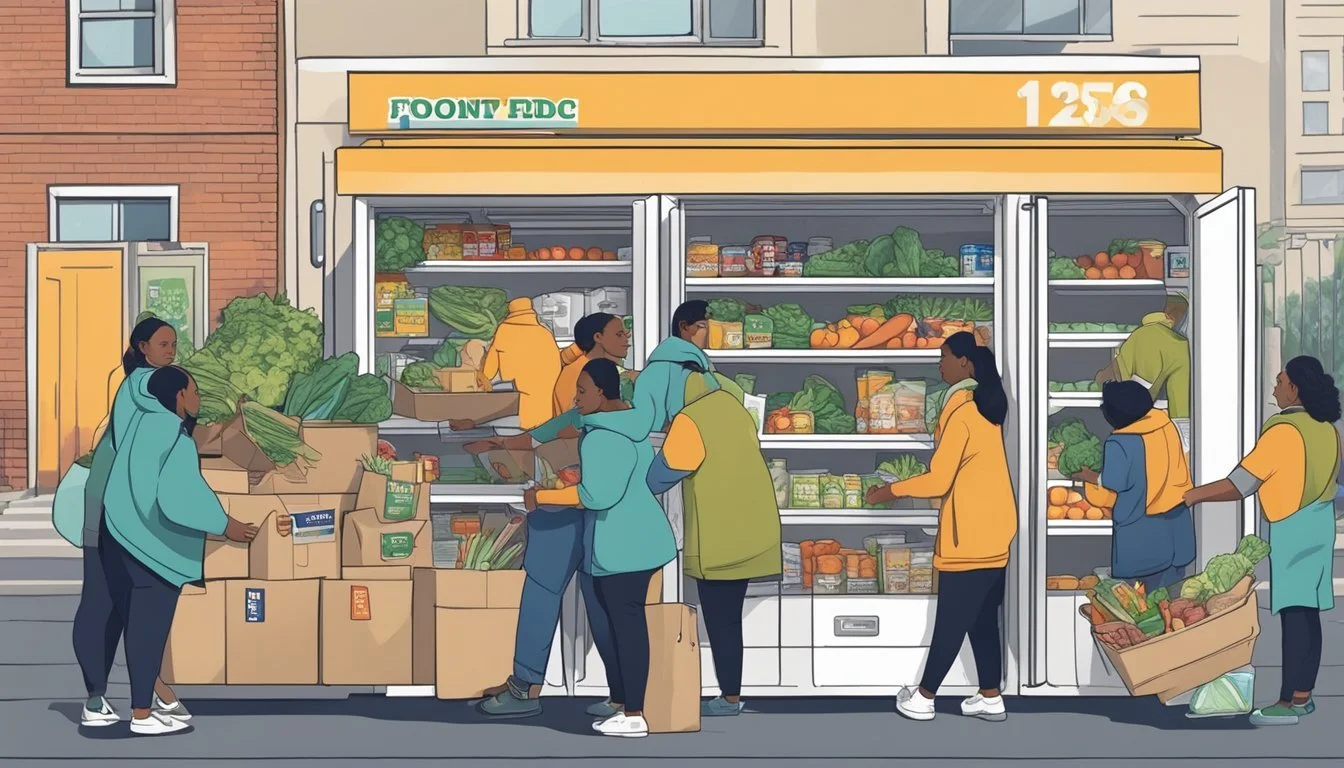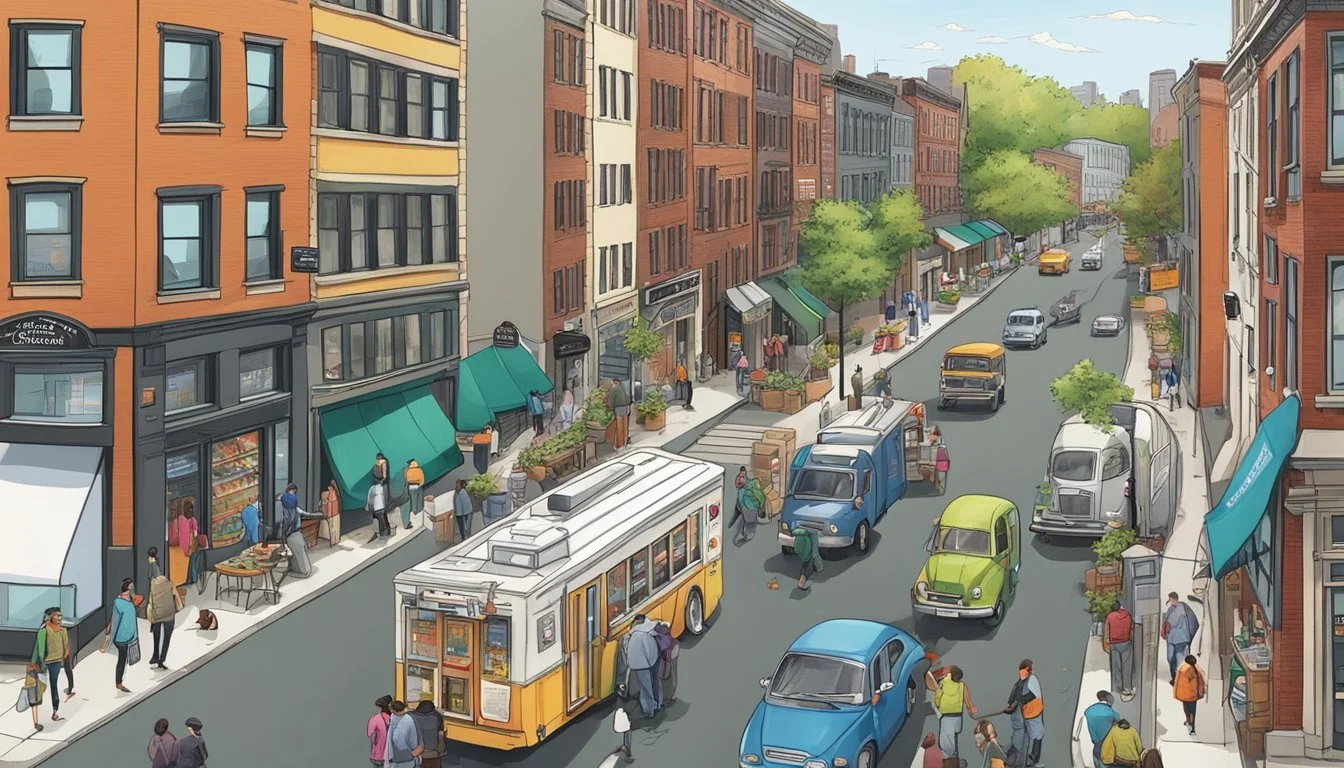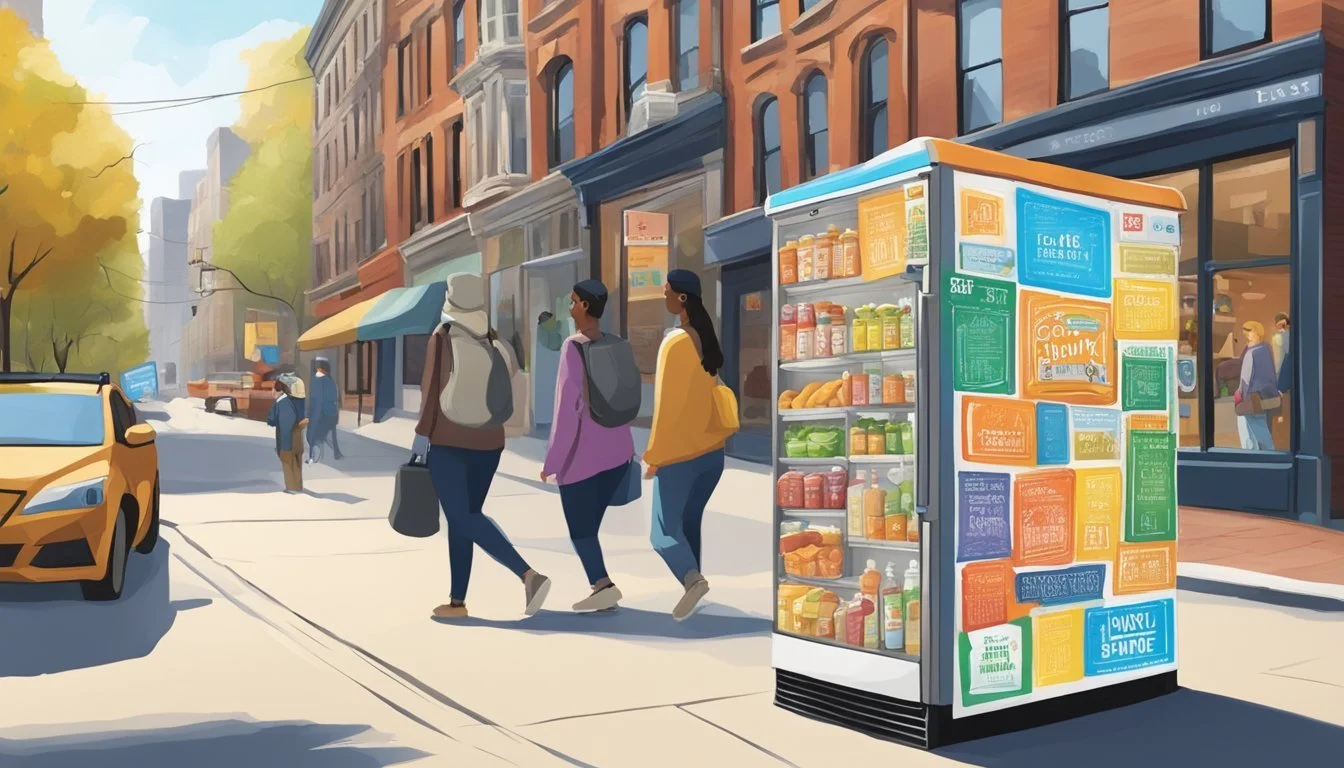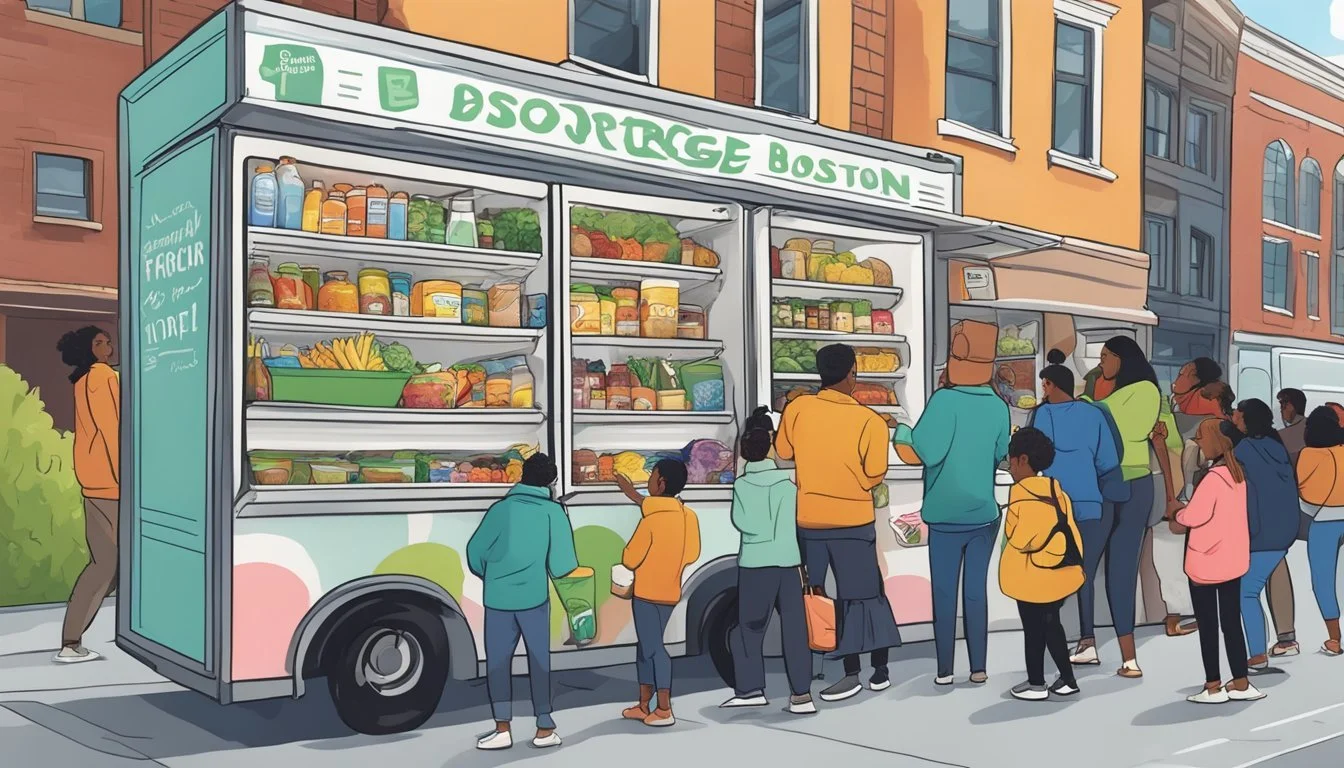Boston, MA Community Fridge Initiative
Combatting Food Insecurity Locally
Community fridges in Boston, Massachusetts, have become an innovative approach to tackling food insecurity and fostering community solidarity. These publicly accessible refrigerators offer a place where individuals are welcome to take what they need and donate what they can, epitomizing the saying "take what you need, give what you can." Initiated as a response to the increased food needs resulting from the COVID-19 pandemic, the network of community fridges aims to combat the persistent issue of hunger while reducing food waste in a sustainable and community-centric manner.
The city of Boston has seen a number of these community-led efforts emerge to bridge the gap in food accessibility. Managed by volunteers and supported by local businesses and residents, these fridges are stocked with fresh produce, prepared meals, and other food items. The effort is not only a testament to Boston's community spirit but also a reflection of the necessity to address food scarcity in a way that maintains dignity and promotes mutual aid.
As an extension of the food justice movement, Boston's community fridges operate under the belief that access to nutritious food is a fundamental right. Their locations are strategically chosen to ensure ease of access, particularly in neighborhoods hit hardest by food insecurity. They serve as physical spaces that embody the principle of sharing resources and collectively working towards a healthier, more equitable food system for every Bostonian.
Origin and Importance of Community Fridges
Community fridges in Boston serve as a testament to community organization and resilience, being a direct response to food insecurity exacerbated by the Covid-19 pandemic. These initiatives rely on public contributions and aim to provide accessible food sources to those in need.
History of Community Fridges
Boston's engagement with community fridges began in September 2020, as a collaborative effort to address increasing food needs within the community. Initially inspired by similar endeavors in other cities, Bostonians launched over 10 community fridges, which are managed by volunteers and depend on the community for filling and maintenance.
Role in Food Insecurity Mitigation
The primary objective of these fridges is to combat food insecurity, an issue prevalent in urban areas. By offering a place where individuals can give or retrieve food items with no questions asked, they ensure a consistent source of free food, making a substantial difference in the lives of many residents.
Key Components of Community Fridges:
Open to all, no eligibility requirements
Stocked with food by community members
Operate on principles of mutual aid and trust
Impact of the Covid-19 Pandemic
The onset of the Covid-19 pandemic saw a surge in demand for such community-led solutions due to job losses and economic instability. Community fridges emerged as a crucial support system for those affected, reflecting a community's capacity to adapt and care for its members during crises.
Boston’s Community Fridge Network
Boston's Community Fridge Network embodies a grassroots approach to food insecurity, leveraging community engagement and mutual aid.
Concept and Philosophy
Community fridges in Boston are a practical representation of food justice, designed to serve as a free food resource for anyone in need, regardless of their circumstances. The philosophy is simple: take what you need, leave what you can. This open-access model reflects the ethos of sharing and caring for neighbors, fostering a sense of ownership and community among diverse populations.
Mutual Aid and Community Support
Community support is vital for the network's sustainability. Mutual aid groups, including 'A New World in Our Hearts', underpin the network by organizing volunteers and donations. They ensure a consistent supply of fresh and nutritious food, acting as the backbone of this reciprocal support system. Citizens, local businesses, and organizations are encouraged to contribute, embodying the principle of collective welfare.
Expansion Across Neighborhoods
Originating as a single fridge, the network has seen a significant expansion. Here's a snapshot of community fridges across various neighborhoods:
Jamaica Plain: A vibrant, culturally rich area actively maintaining its community fridge.
Somerville: An inclusive neighborhood supporting its local fridge.
Allston and Brighton: Share several fridges, emphasizing community solidarity.
Roslindale: The Roslindale Community Fridge operates with heartfelt community engagement.
Mattapan: The Mattapan Community Fridge provides accessibility to fresh food, rallying the community together.
Fridges in the Greater Boston Area
Extending beyond the heart of the city, the Greater Boston area has joined in solidarity with the network. Notable fridges include:
Brookline Community Fridge: Addresses food scarcity within this populous neighborhood.
Dorchester Community Fridge: Located at 1471 Dorchester Avenue, this fridge echoes the commitment to food access.
Hyde Park: Home to residents working collaboratively to feed their community.
Each neighborhood's efforts demonstrate the collective aim of the network to combat food insecurity and encourage community resilience throughout the Boston Area.
Participation and Volunteering
Participation and volunteering are vital for the sustainability of community fridges in Boston, predicated on mutual aid and collective effort. This section elaborates on the avenues for involvement and the ground rules governing participation.
How to Get Involved
Individuals eager to contribute to the community fridge initiative can start by identifying the most convenient location for them and reaching out to the organizers. These fridges rely on community involvement to ensure a steady flow of donations and maintenance. The simplest way to find opportunities for involvement is through Instagram and other social media platforms where many community fridge initiatives maintain active pages with updates and calls for help.
Guidelines for Donations and Use
The success of community fridges rests on clear donation guidelines to guarantee food safety and accessibility. As a rule, perishable food items like fresh produce and bread are welcome, while homemade meals and expired products are not. These guidelines ensure that users of the fridge can trust the quality and safety of the food inside.
Suggested donation items include:
Fresh fruits and vegetables
Sealed pantry staples (e.g., pasta, rice)
Unexpired canned goods
Items not accepted:
Alcohol or drugs
Opened packages
Anything beyond its use-by date
Role of Volunteers
Community fridges in Boston are largely volunteer-run, making the role of volunteers essential. They are tasked with regular checking and cleaning of the fridges, organizing food drives, coordinating pick-ups and deliveries of donations, and sometimes offering translation services for non-English speakers. Furthermore, volunteering may also involve community outreach and fostering partnerships with local businesses to secure consistent food contributions.
Community Engagement Through Social Media
To amplify reach and engagement, many community fridges harness the power of social media. Instagram serves as a key platform, providing updates on the refrigerator's status, calling for volunteers, showcasing the impact, and educating about donation guidelines. Active social media involvement ensures a wider dissemination of information and attracts both monetary donations and physical contributions to sustain the fridge's operations.
Locations and Accessibility
Community fridges in Boston serve as crucial hubs for food sharing, aimed at mitigating food insecurity. They are strategically placed to be easily accessible, supporting areas with limited grocery options.
Key Locations of Community Fridges in Boston
Somerville Community Fridge: Part of a network providing food donations throughout the city.
Cambridge: Hosts several fridges that offer free food to those in need.
Coast Community Fridge: Located in a spot that is reachable by the local community.
Fridge in the Square: A central location that is well-known and utilized.
Dorchester: The community fridge initiative supports members of this neighborhood.
Malden Community Fridge (Linden Square): Active since March 2021 and supports local residents.
South End Fridge: Aids in the effort to distribute free food.
Newton Community Freedge: Offers food donations in a convenient location.
Earthy Boston – Fenway Fridge: Provides another option for people to access food in the area.
Outdoor Fridge: Typically easy to find and access.
Fridge at the Bridge: A strategically placed fridge to serve the community.
Accessibility and Addressing Food Deserts
Local Community Fridge: By increasing the number of fridges in various neighborhoods, Boston is improving food accessibility.
Food Donations: These are critical to the fridges' operation, enabling consistent stock and offering support to whoever needs it.
Accessibility: Focused on being within walking distance for many residents, particularly those in food deserts.
Food Justice: The community fridges are an important part of the food justice movement, ensuring equitable access to food regardless of socioeconomic status.
Sustainability and Food Donations
In Boston, MA, community fridges offer a dynamic approach to combat food insecurity while promoting sustainability. These fridges reduce food waste and support local agriculture, allowing residents to donate and receive food.
Reducing Food Waste through Community Fridges
Community fridges in Boston are instrumental in mitigating food waste, a pressing environmental issue. By providing a venue for sharing surplus food, these fridges ensure that food such as bread, fresh produce, and shelf-stable pantry items reaches those in need instead of landfills. Moreover, they serve as a symbol of community self-help, effectively complementing traditional food support systems like food pantries and shelters.
Types of Acceptable Food Donations
When donating to community fridges, individuals should consider safety and utility. Accepted items typically include:
Pantry Staples: rice, pasta, and canned goods
Fresh Produce: clean vegetables and fruits
Dairy Products: milk and cheese with appropriate expiration dates
Spices: to diversify and enhance the flavor of meals
It's important to note that for health and safety reasons, raw meats and homemade meals are generally not accepted.
Supporting Local Agriculture
Boston's community fridges do more than just feed people and reduce waste; they also encourage donations of local, sustainable produce, which supports area farmers and contributes to a resilient local food system. Donations might come directly from local agricultural operations or through community-supported agriculture (CSA) shares that are not fully utilized by subscribers. This creates a win-win situation, where fresh, nutritious food reaches those facing food insecurity, and local farmers gain an alternative outlet for their surplus produce, strengthening the region's food ecosystem.
Health and Safety Guidelines
The health and safety guidelines for community fridges in Boston are designed to ensure that these resources are safe and accessible while addressing public health concerns.
Maintaining Safe and Hygienic Practices
Community fridges must be situated on private property with permission from the owner and located on hard, non-porous surfaces for easy cleaning and disinfection. The placement should be away from areas where garbage is disposed of or stored to prevent contamination. Regular cleaning and disinfection of the fridge, as per the health department's standards, are essential to maintain food safety and hygiene. All food offered should adhere to safety guidelines, which include:
Ensuring food is within its expiration date and safe for consumption.
Packaging and presenting food in a way that minimizes the risk of spoilage or contamination.
Covid-19 Specific Considerations
With the onset of the COVID-19 pandemic, specific guidelines have been implemented for community fridges to minimize the risk of coronavirus transmission. These include:
Regular sanitization of surfaces that are frequently touched by individuals.
Encouraging donors and users to wear masks and maintain social distancing while accessing the fridge.
Clear communication of the importance of not handling the food if one is experiencing COVID-19 symptoms or has been in contact with infected individuals.
A system that ensures a minimal contact approach to both stocking and taking items from the fridge to reduce possible virus spread.
Promotion and Awareness
Promoting community fridges in Boston, MA, involves a multi-faceted approach that leverages various platforms for increased visibility and engagement. This strategy allows for more efficient awareness-raising among local residents and organizations.
Boosting Visibility with Social Media
Instagram and other social media platforms play a crucial role in promoting Boston's community fridges. The use of vibrant images, regular updates, and hashtags helps to inform the public about fridge locations, availability, and needs. For example, initiatives such as the Fenway Fridge utilize their Instagram account @earthy.boston to connect with the community effectively.
Social Media Accounts:
Fenway Fridge: @earthy.boston
Jamaica Plain Community Fridge: @bostoncommunityfridge
Educational Outreach and Partnerships
Partnerships with local organizations help to educate and inform the public about the community fridge movement. Collaborations with entities like the Greater Boston Food Bank and Project Bread extend the reach and effectiveness of educational campaigns. These partnerships ensure that practical information and resources are distributed to support the fridges and those who benefit from them.
Partnerships:
Educational materials and assistance programs from Project Bread
Support from the Greater Boston Food Bank to address food insecurity
Through these combined efforts in Boston, awareness of community fridges is continually increased, thereby strengthening the network of support and food accessibility for all residents.
Community Stories and Testimonials
Community fridges in Boston, adhering to the "Take What You Need, Give What You Can" ethos, have touched lives, showcasing the strength of grassroots initiatives and the compassionate spirit of communities across the city. These refrigerators operate as a beacon of food justice, providing a snapshot into the world of local urban sharing economies.
Success Stories from Local Initiatives
Boston's introduction of community fridges has spurred a city-wide movement, propelling food justice to the forefront of local attention. The Dorchester community fridge, established on Dorchester Avenue, not only serves as a food access point but also represents a collective triumph in the fight against food insecurity. Similarly, the Malden Community Fridge, successfully running since March 2021, exemplifies how local engagement can sustain such initiatives over time.
Local Community Fridge Projects, frequently initiated and maintained by volunteers, highlight the direct positive outcomes of communal involvement. Each fridge tells a tale—of neighborhoods uniting and the proliferation of mutual aid networks—which reaffirms the core values of the City of Boston.
Personal Impact on Community Members
Community fridges have more than just filled stomachs—they've fostered a sense of unity and support among residents. For instance, Karina Gaft-Azcue points out the simplicity yet profound impact of the concept—where anyone can contribute or take food—reinforcing the dignity and agency of every individual who interacts with the fridge.
Testimonials from those who've found solace in the assistance the fridges offer echo a shared sentiment: community fridges transcend merely being a resource. They are symbols of hope and trust within the community, embodying the principle that together, residents can care for one another.
Looking Forward
The expansion of Community Fridges in Boston represents not just a response to immediate needs but a commitment to addressing food insecurity in innovative and community-driven ways.
Future Projects and Goals
In the Greater Boston area, the network of community fridges is envisaged to grow and serve more individuals in need. The goal is to incorporate seasonal initiatives such as Thanksgiving turkey drives, ensuring access to holiday meals (What wine goes well with holiday meals?) for all. Additionally, partnerships with food banks aim to bolster the consistency of food availability. Massachusetts's approach to mutual aid looks to coordinate with local food banks to optimize food distribution and minimize waste.
Thanksgiving Turkey Drive: Leverage community support to provide holiday meals.
Partnership with Food Banks: Strengthen the link between community fridges and regional food banks.
Long-Term Vision for Food Security
For Boston and the Massachusetts region at large, the long-term vision for food security involves a sustainable model of mutual aid efforts. They are focused on maintaining a system that not only addresses immediate food needs but also encourages community participation and ownership.
Sustainable Mutual Aid: Establish and maintain an enduring support network.
Community Involvement: Foster a culture of care and shared responsibility in the Boston area.









